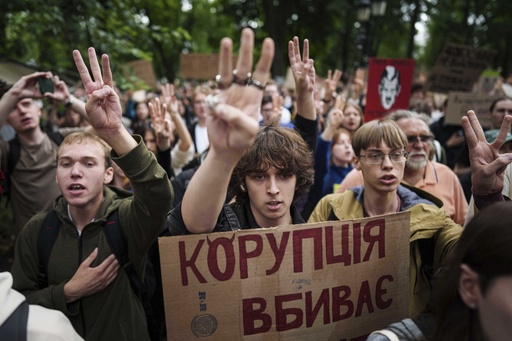Ukraine’s Parliament took a decisive step on Thursday by endorsing a new legislative proposal from President Volodymyr Zelenskyy. This move reinstates the independence of two critical anti-corruption agencies in the country, overturning a previous decision by Zelenskyy last week that had sparked widespread criticism.
Initially, the president’s action to place these watchdogs under the supervision of the prosecutor-general alarmed many, drawing strong reactions from Ukrainian citizens, the European Union, and international human rights organizations. Critics feared such a shift could compromise investigations and provide protection for the government’s allies by shielding them from scrutiny.
Addressing corruption remains a key priority for Ukraine as it seeks to meet its EU membership aspirations and secure critical financial support from Western nations amidst the ongoing conflict that has persisted for nearly three and a half years. Public support for combating corruption remains robust.
In a demonstration of political urgency, Zelenskyy enacted the new measure into law within hours of its approval. “This guarantees normal, independent operations for anti-corruption bodies and all law enforcement agencies in our state,” he stated, underlining the direct benefits to the citizens.
Zelenskyy has been an emblematic figure in Ukraine’s resistance to Russian aggression. However, his recent anti-corruption reform, perceived as damaging, threatened to tarnish both his and Ukraine’s reputation internationally, raising concerns about the country’s commitment to uphold the EU’s democratic standards.
EU foreign policy representative Kaja Kallas acknowledged Ukraine’s renewed commitment to fundamental European values through this restoration. Likewise, EU Enlargement Commissioner Marta Kos, who had voiced disapproval of the previous legislative changes, expressed relief at the bill’s passage, urging Ukraine to keep reforms a priority despite existing challenges.
Foreign Minister Andrii Sybiha reiterated Ukraine’s dedication to reform and combating corruption, acknowledging Zelenskyy’s decisive leadership. “We got it fixed,” he confidently remarked.
Amidst the turbulent parliamentary session, broadcast live for the first time since the war’s inception, tensions erupted into a physical altercation between lawmakers, set against a backdrop of Ukrainian and EU flags.
The public backlash against Zelenskyy’s initial decision sparked protests nationwide, marking the first significant public dissent since Russia’s intensified invasion in February 2022. While not calling for Zelenskyy’s ouster, these protests highlighted potential erosion in public confidence at a critical juncture.
As Russia ramps up its offensive maneuvers and increases its shelling of Ukrainian cities, there is additional pressure to reinforce Ukraine’s defenses, compounded by uncertainties about further Western military aid.
Transparency International’s Ukrainian branch had also criticized the earlier legislation, describing it as undermining pivotal reforms that have shaped Ukraine since the 2014 Revolution of Dignity.
Zelenskyy clarified his initial intentions were aimed at expediting investigations, securing more convictions, and minimizing potential Russian interference, though he didn’t provide specific details. Noting the public’s response, he introduced the new bill to affirm that no prosecutorial authority should direct or interfere with anti-corruption agencies.
The Ukrainian Parliament, known as the Verkhovna Rada, showed overwhelming support for Zelenskyy’s proposal, with official records showing 331 votes in favor, with just nine abstentions.


